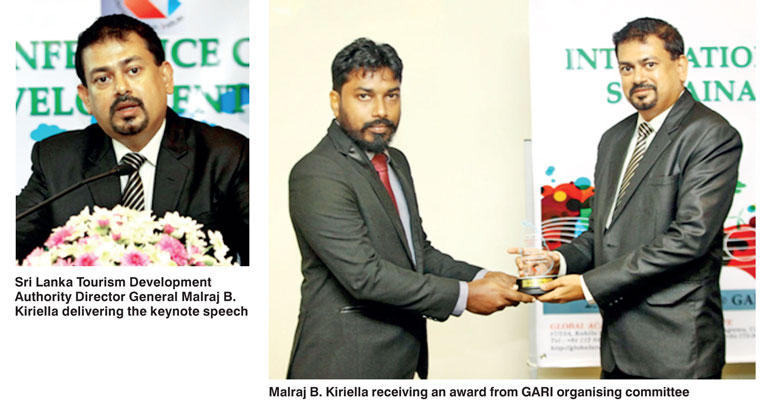Sunday Feb 22, 2026
Sunday Feb 22, 2026
Tuesday, 29 August 2017 00:56 - - {{hitsCtrl.values.hits}}
 The Inaugural Session and the Technical Sessions of Sri Lanka, The GARI Summer Research Symposium 2017 were held on 25 August at Galle Face Hotel, Colombo. The conference was organised by Global Academic Research Institute (GARI), an international scientific research conference organiser in collaboration with international universities and institutions.
The Inaugural Session and the Technical Sessions of Sri Lanka, The GARI Summer Research Symposium 2017 were held on 25 August at Galle Face Hotel, Colombo. The conference was organised by Global Academic Research Institute (GARI), an international scientific research conference organiser in collaboration with international universities and institutions.
The conference was organised under two main themes; Peace and Conflict Management and Sustainable Development which empirical, conceptual and methodological papers were received from academics, practitioners and public policy makers were accepted paying austere attention to the academic standards of the papers. To maintain consistency, authors were prescribed to follow the academic writing format of the GARI Publishers. The conference was attended by participants from Sri Lanka, Canada, South Africa, India, Czech Republic, Maldives and Thailand.
Delivering the keynote speech, Sri Lanka Tourism Development Director General Malraj B. Kiriella emphasised the need of establishing balance between environmental, economic and socio- cultural aspect of tourism development to guarantee its long-term sustainability.
Kiriella stated that tourism is today the third largest export industry in the world after chemicals and fuels. It brings hope, prosperity and understanding to so many lives and livelihoods all over the world. Last year alone, 1.235 million travellers crossed international borders in one single year. By 2030, this 1.2 billion will become 1.8 billion.
Focusing on Sri Lanka, Kiriella stated that being a country is endowed with diverse flora and fauna and with a rich cultural heritage, the benefits of sustainable tourism will further pave way to boost the industry. Socially, the benefits such as social inclusiveness, employment and poverty reduction and alleviation, preserving of cultural values and intercultural understanding and tolerance are achievable by complying to sustainable tourism.
“In 2016, employment generation in tourism sector, both direct and indirect was 335,659. Therefore, by adopting sustainable tourism this amount can be further increased and it will pave way to poverty reduction too. In terms of economy, inclusive and sustainable economic growth fairly distributed among all stakeholders will be the ultimate benefits. During the last few years Sri Lanka recorded a steady economic growth rate, and with a flourishing tourism industry this can be further improved. In terms of environment, the steps towards sustainability will ensure the optimal use of environmental resources, maintain ecological processes and help to conserve natural heritage and bio diversity,” said Kiriella.
Speaking on Blue Economy, Kiriella mentioned that Sri Lanka being an island covered with Indian Ocean, the need to stimulate a ‘blue growth’ is greatly felt. However, the ecosystems upon which many ocean economic activities depend are changing at an unprecedented rate due to human activities, resulting from overfishing, poorly planned coastal development, land-based sources of pollution and etc. Therefore, sustainably developing ocean spaces for economic growth and development while maintaining ocean health, can define a new era of economic opportunity for island nations like Sri Lanka.
By 2025 it is hoped that Sri Lanka will be identified as a place for memorable, authentic and diverse tourism experiences. Therefore, Kiriella highlighted that this is high time to adopt a statistical framework capable of measuring sustainable tourism in an effective manner. He further added that, a new accounting framework is underway to measure the economic impact of tourism in a national economy on year basis. This concept is known as ‘Tourism Satellite Accounts’, which will help to measure value added of tourism industries, tourism direct gross domestic products, tourism’s ranking compared to other economic sectors, tourism consumption, etc.
“The benefits of tourism stretch far and wide. Tourism allows us to share humanity’s most valuable cultural and environmental treasures with the world. Tourism enables us to teach skills and provide jobs. Therefore, respect nature, respect culture and respect your host,” Kiriella stated.
